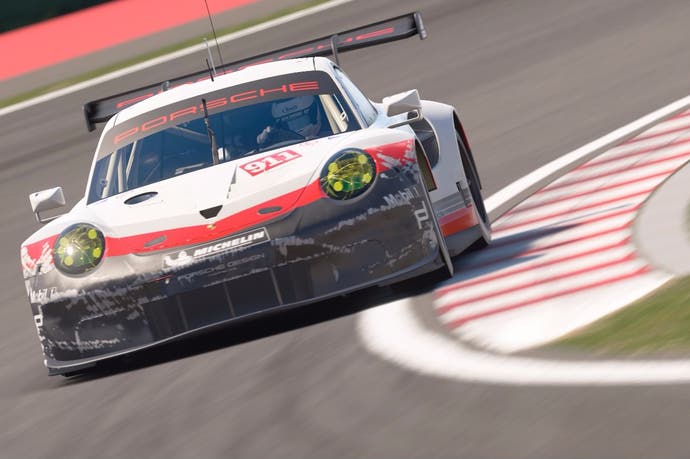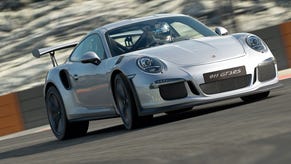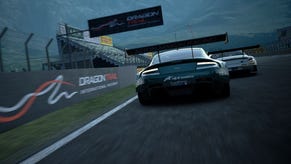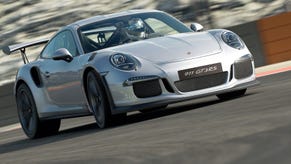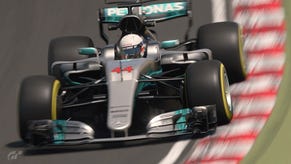Gran Turismo Sport fixes the series' racing - but at what cost?
Chequered past.
'The real driving simulator', runs Gran Turismo's long-serving tagline, a point of pride as well as something of a distinction - whether made consciously or not - between itself and its competitors. Gran Turismo has has always done a great job of the driving. It has not, historically, really delivered when it comes to the racing side of things, though.
That 'Sport' suffix for the series' PlayStation 4 debut sets an expectation which this new Gran Turismo happily meets. The online racing is several steps beyond what's gone before and, judging from a few days with the generous demo that's been live this week, Polyphony Digital has fulfilled one of its main objectives for this new game. Gran Turismo Sport really does feel like an 'iRacing lite' for consoles.
What makes it work - and, perhaps more importantly, why do racing bores like myself keep bringing up iRacing, a PC game that's coming on for a decade old and one with a relatively small, if very dedicated, community? It's because iRacing sets a gold standard for online racing, and its big ideas have taken a bafflingly long time to find their way into other games.
Chief amongst those is the safety rating, which is primarily a way to emulate the sense of risk that comes in real racing. When you're sitting in front of a TV screen, controller or plastic wheel in-hand, there's not quite the sense of danger that comes on the racetrack. How best to instil that in players? Quite simply by attaching a score to your own personal safety - perhaps because people who play games value high scores just as much as they do their own personal well-being.
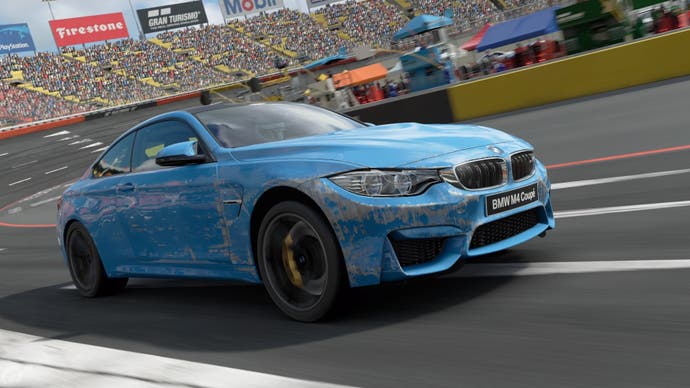
In short, clatter into another car, career off the track or collide with the scenery and that score will plummet. Keep it clean, and you'll have a better safety rating and, in turn, will be entitled to race with other drivers who are also able to show a little restraint out on track. It all leads to a surprisingly weighty sense of consequence to events, and - once you've worked your way up the ranks a little - to clean racing.
Other console racers have appropriated their own versions - Forza has its Trueskill system, while Project Cars 2 introduced Slightly Mad Studios' own variation on the theme - but Gran Turismo Sport does well by copying iRacing pretty much wholesale, and even in the early demo, its impact is noticeable. There's a bit more respect between rivals, something which will hopefully blossom once the system properly beds in.
It's not without its faults, and an initial sense of frustration. Blame isn't apportioned in incidents, something that can feel unfair when you're starting out in the jostle of other amateur drivers. But eventually it does make some sense, especially when up against more seasoned competitors who appreciate that rubbing really isn't racing. Gran Turismo Sport also has some of its own quirks, with the penalty for being rear-ended by an overeager player a little too harsh at the moment - though that's a known issue that'll hopefully be addressed come launch next week.
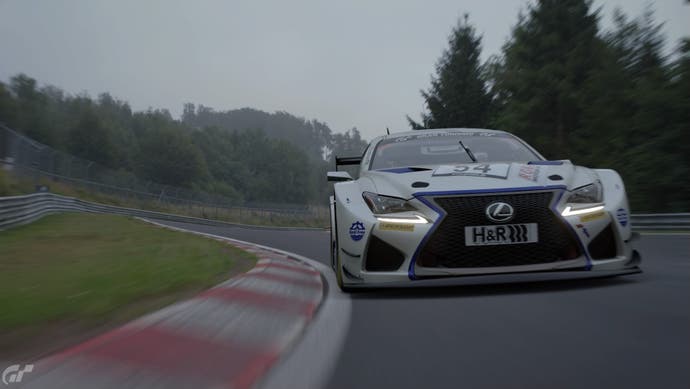
It has already made for some incredible online racing. A GT4 race around Interlagos played host to a handful of noble scraps, as myself and another driver swapped places continuously - and with no small amount of courtesy, too. A one-make kart race around the all-new Kyoto Driving Park provided the perfect backdrop for some intense dicing that was, remarkably, kept clean throughout - my fondness for that particular event helped, no doubt, by how it brought about my first win. And winning in Gran Turismo Sport can feel like quite the achievement.
The scheduling in Sport mode contributes to that, and is another smart lift from iRacing. With races taking place every 20 minutes, prefaced by an open qualifying format, there's a sense of occasion to each event. What there isn't, just yet, is that sense of overarching achievement that iRacing does so well, nor the sense of an ongoing career you can tend to. In iRacing you invariably start in a Mazda MX5 before carving out your own career path, working your way up through the ranks and formulae for your own pre-defined endgame, whether that be multi-class sportscar racing or a premier open wheel series such as F1.
That, surely, is to come with scheduled events and the nations and manufacturers cups that will be part of Gran Turismo Sport - though how exactly that will work remains fairly mysterious to me for now. Polyphony, true to its own frustrating form, is remaining ambiguous about it all at present. Some clarity before release would be greatly appreciated, though I doubt it'll be forthcoming.
There's also the question of how much Gran Turismo has lost in its pursuit of its new vision, and that equation will likely turn off more people than those who'll be excited by this purer breed of racing. The car list is paltry, with some surprising omissions, while the track list is similarly slim, especially coming off the back of the excesses of Gran Turismo 6. Then there's the perception that Gran Turismo Sport's single-player game has suffered - an understandable opinion, even if there's a fairly generous amount of activities in place of the more traditional Gran Turismo career.
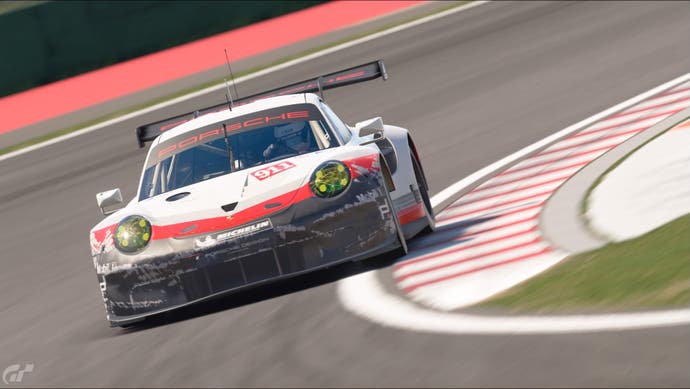
Know that the single-player has gained something from this new focus, though. The final mission available in the demo is a 30-lap endurance event around the fictional Lake Maggiore circuit in the Porsche 911 RSR. It's a multi-class event, with a 30-strong field, and it's quite unlike anything I've played in Gran Turismo before. The density of the field, as well as some vastly improved AI (though that's improved by Gran Turismo's standards - don't expect it to challenge Project Cars 2 or F1 2017 in this regard) makes for an engrossing race, but what sets it apart is its embrace of the endurance side of the equation.
Gran Turismo Sport's other great appropriation is that of the spirit of GT3 racing - perhaps contemporary motorsport's most buoyant category, and certainly one of its most entertaining. You'll see that in its borrowing of terms and concepts such as Balance of Performance, used to keep disparate machinery in check, and you'll also feel it in races themselves where fuel and tyre management are paramount to success. It's all so much more focussed than the endurance events of prior Gran Turismo games.
It's all introduced smartly enough, asking you to juggle fuel consumption via engine mapping in-race and complemented by a pit system that lets you easily adjust your strategy on the fly. The results are fantastic - halfway through this hour-long race, I was struggling to double-stint a pair of tyres and enjoying the challenge at hand in what amounts to some of the most fun I've had in a single-player racing game since the heady days of GTR 2. Now, if only all this was possible with dynamic day/night transitions and weather, features which Gran Turismo Sport has regretfully ditched this time out.
Such is the rub with Gran Turismo Sport, a game whose new focus brings about plenty of pleasant surprises, but which has also caused a fair number of casualties along the way. Whether that new emphasis makes up for all that's been lost remains to be seen - but it's certainly been fun playing a Gran Turismo that's got an all-new sense of purpose.
